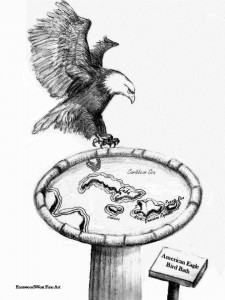A Birthday Card for the Man Who Has Everything
Posted in General, On This Day on February 24th, 2010 by Eugene Finerman – Be the first to commentFebruary 24, 1500: An Infant Inherits the Hapsburg Jaw and Europe
Monarchies do tend toward nepotism. Today, on the birthday of Charles V, I would hate to suggest that he did not deserve to be King of Spain and Southern Italy, Grand Duke of Burgundy, Duke of Austria and Holy Roman Emperor. However, his resume consisted of a birth certificate. At least, he had the right parents at the right time.
His story begins in late 15th century Spain with the marriage of young Phil Hapsburg to Joan, the oldest daughter and heiress of Ferdinand and Isabella. The New York Times and People would have loved covering the events, but their reporters would have been burned as part of the festivities. (All the best Spanish weddings included an auto da fe.)
Phil was quite a catch. Besides being good looking, his family’s business included Austria and the Holy Roman Empire. Furthermore, his late mother had left him all Belgium and the Netherlands. His mother-in-law died in 1504; expelling most of the doctors from Spain proved unhealthy. Joan was supposed to inherit Mom’s kingdom of Castile, but Ferdinand hated to part with it.
The young Hapsburg may have cheated on his wife but he was loyal to Joan’s fortune; he protested against his father-in-law’s usurpation of Castile and even made vague threats. Then Philip suddenly died. (You can only imagine how surprised Ferdinand was.) Joan went mad and refused to have her husband buried; she transported his casket wherever she went.
Of course, Ferdinand was willing to rule Castile in his demented daughter’s name as well as regent for his young grandson Charles, who was being raised–safely–in the Low Countries. Ferdinand died in 1516 of undeservedly natural causes, so the 16-year-old Charles inherited Aragon and Sicily and finally got to rule Castille.
In 1519, his paternal grandfather died–leaving Charles the family estate of Austria and the job opening of Holy Roman Emperor. So a teenager now ruled all of Spain and its burgeoning colonial empire, Southern Italy and Sicily, the Low Countries and Austria. He was the most powerful man in Christendom since Charlemagne; so naturally the Pope had to pick a fight with him.
Leo X could ignore Luther and a Turkish army advancing into central Europe, but he was determined to annoy the young Hapsburg. He tried to prevent Charles’ election as Holy Roman Empire, a position that had long been regarded as a Hapsburg prerogative. Then, Leo refused to coronate Charles. (He was the fifth emperor Charles.) The Pope evidently thought that a 19 year-old was unworthy of such power and responsibility. Of course, Leo had been appointed a cardinal when he was 13, and the deMedici family had been bought their kid the papacy; but the young deMedici begrudged the even younger Hapsburg.
Not feeling terribly loyal to the Papacy, Charles proved initially quite tolerant of the fulminations of Professor Luther. After all, the Church definitely needed reform; and wasn’t that Luther’s sole aim? Yes, Charles was wrong; but by 1521, the heresy had proved so popular in Northern Germany that only a civil war could crush it. Charles needed the support of the German princes of the North; he intended to conquer Italy if only to make his point to the Pope.
Leo died without having the pleasure of meeting Charles. However, Pope Clement VII (and Leo’s cousin) was persuaded by the German sack of Rome in 1527 to coronate Charles. Being a Hapsburg hostage made Clement very considerate of Charles’ feelings. When Henry VIII wanted an annulment from Catherine of Aragon, the Pope naturally asked Charles if he wished his aunt Catalina declared a whore! Charles proved reluctant, so the Pope refused Henry’s request.
Henceforth, the Popes would proved deferential to Charles V. If brute force was not sufficiently persuasive, Charles was also contributing a tithe of the Aztec and Inca generosity to the Church. Although personally pious–especially as he got older, Charles was not a religious bigot. Yes, Spain burned anyone who showed a suspicious reluctance to pork but through the rest of his realm he proved ecumenical. He reached a political detente with the Lutherans of Germany; after the Turks had conquered Hungary and had cavalry patrols around Vienna, the Emperor really couldn’t afford to quibble over transubstantiation versus consubstantiation. And since the Dutch wanted to make money rather than trouble, Charles could turn a blind eye to Calvinism.
Charles abdicated all his thrones in 1557 and retired to a monastery where he died the following year. His younger brother Ferdinand inherited Austria and the imperial title. Charles’ son Philip received Spain and the Low Countries but none of his father’s prudence.
So, aside from bad taste in children, Charles V really did a pretty good job. Happy birthday.

